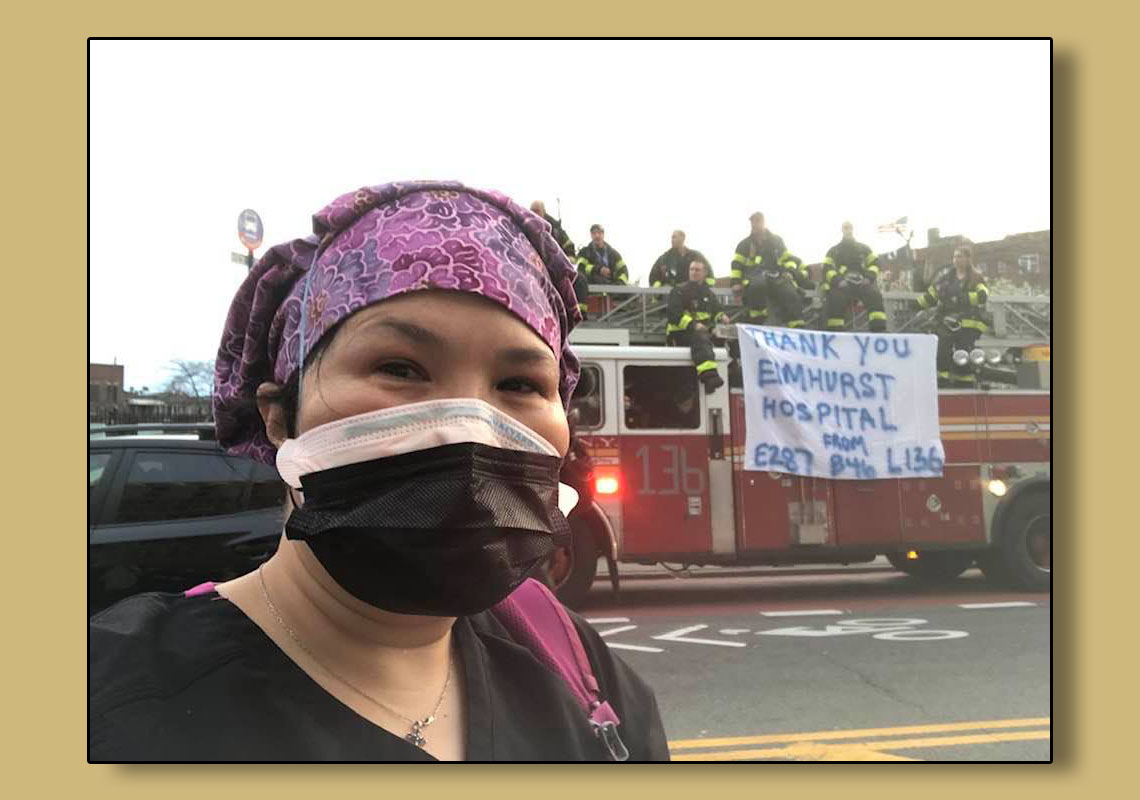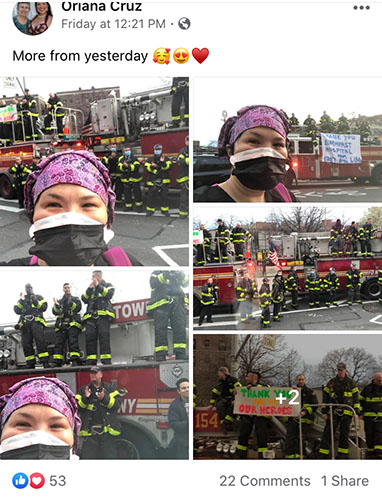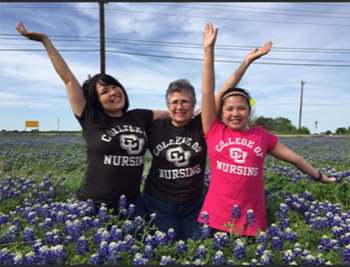Running Toward Danger
Dana Brandorff | College of Nursing Apr 10, 2020
For Oriana Cruz, CU Nursing Family Nurse Practitioner alumna (FNP ’18), she is one of those rare breeds who run toward danger. And run she did --- all the way to ground zero in New York City. “When I heard about the need in New York, I signed up with Krucial Staffing, a traveling nurse company based out of Kansas,” said Cruz. She was deployed almost immediately to Elmhurst Hospital.
 Seen as the “epicenter within the epicenter” of the Covid-19 crisis in New York City, Elmhurst Hospital is a 545-bed facility that serves as a safety net institution for a largely working-class immigrant population. The coronavirus has quickly spread through this community, and the hospital is currently operating at more than 100% capacity. At the present time, New York leads the country in cases with more than 161,000 and seven thousand deaths.
Seen as the “epicenter within the epicenter” of the Covid-19 crisis in New York City, Elmhurst Hospital is a 545-bed facility that serves as a safety net institution for a largely working-class immigrant population. The coronavirus has quickly spread through this community, and the hospital is currently operating at more than 100% capacity. At the present time, New York leads the country in cases with more than 161,000 and seven thousand deaths.
Acknowledging that she did not know what she was signing up for when she did so mid-March, Cruz said, “Until you are in the midst of something like this, you don’t know what you don’t know. Ideally, it would have helped to have talked to someone on the ground about what I was walking into.”
Despite the lack of knowledge, she is upbeat about her experience. “I’m likely to sign up again,” said Cruz whose first stint was for 21 days and started March 23. “I am fast approaching my end date,” she said.
Day in the Life of a Nurse in New York During Covid-19 Crisis
Cruz’s day begins at 6 p.m. where she takes a private bus from her hotel to Elmhurst Hospital. Her shift in the Medical Intensive Care Unit (MICU) starts at 7 p.m. and ends at 7 a.m.
Upon arrival, she dons her ‘bunny suit’ and an N-95 mask and covers it with another surgical mask in an attempt to make the N-95 last longer. “When we arrived at the end of March there was no training. We didn’t do a fit for the N-95 masks and can’t be assured that it fits… So, we do what we can to create more protective layers.” Her two ‘bunny suits’ are kept at the hospital and reused by her.
Her company has been “great. They tell us if we don’t feel safe, don’t enter the facility. So we can decline,” said Cruz. For Cruz and her fellow traveling nurses, that hasn’t happened yet. They still rush in where many fear to tread.
In the MICU where she spends her days, 16 beds are full of patients who range in age from 32 – 63 years of age. “We are consumed by coronavirus patients,” said Cruz. When asked about innovative therapies like plasma transfusions and nitrous oxide, Cruz said, “We are doing what we can, but there is no money for experimental types of treatment.” There to help in any aspect she can, Cruz assists at bedside procedures, picks up blood for transfusions, places orders for medications, does chest compressions during CPR, and calls family members to update them on a patient's health status or imminent death. For Cruz, “It’s heartbreaking. There are so many losses. I had to call a mother to tell her that her 38-year-old son passed away.”
 The nurses work 14 days on, one day paid leave and six on. “It’s tiring,” said Cruz. But she’s invigorated by the patients and how gracious and grateful the patients and staff are for the nurses who traveled to help. “What keeps me going is the resilience of the nurses, physicians, and residents. We are filled with hope when a patient is extubated. That’s what drives us.”
The nurses work 14 days on, one day paid leave and six on. “It’s tiring,” said Cruz. But she’s invigorated by the patients and how gracious and grateful the patients and staff are for the nurses who traveled to help. “What keeps me going is the resilience of the nurses, physicians, and residents. We are filled with hope when a patient is extubated. That’s what drives us.”
Oriana with her mother and niece. "I was pretty excited when I was accepted into grad school and we celebrated!"
Grateful for her CU Education
Cruz credits her training and education from CU College of Nursing for her ability to handle the pressures and the workload of being on the front lines in New York. She fondly recalled her instructors at CU -- Drs. Krista Estes, Rosario Medina, and Kim Paxton. “I had great teachers. They were encouraging and positive. They helped me become who I am today. This is what I was meant to do,” said Cruz.